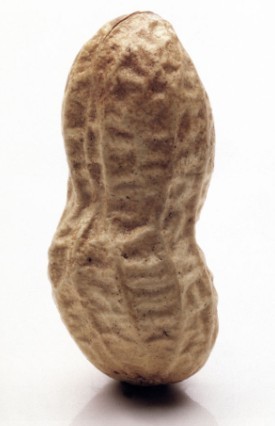五种零食揭示宇宙的形状
By 苏剑林 | 2009-08-06 | 26011位读者 |很久没有翻译过文章了,最近都在偷懒中......不过不能总是偷懒,也要锻炼下了。今天翻译了一篇关于“宇宙模型”的文章,原文来自《新科学家》。原来,宇宙与我们平时吃的零食很相似...... 面包圈、薯片、号角、花生、苹果,这些是你心目中的宇宙吗?让我们来共同见识下!
五种像宇宙的零食
by Michael Marshall这是科学上最著名的问题之一——宇宙是什么形状的?
自托勒密以来,很多物理学家都把宇宙想象成一个球体,但这也许不是正确的答案。科学家们已经提出了许多其他的宇宙的模型,它们都有着一些共同之处:都可以比喻成生活中流行的零食。所以,现在请你打开一包你最喜欢的零食,然后加入我们这食物理论物理之旅。面包圈
这个猜想认为,宇宙可能像一个圆环——或者是环圈——几十年来已经发展成各种不同的形式。由此得出的一个假设认为,宇宙就好像面包圈一样是一条单一的纽带——就好比一个巨大的莫比乌斯带。
我们的宇宙有可能漂浮在一个环形的空间里。弦论的解释是,我们的宇宙是一个三维空间,存在于一个更高维空间中的一个“膜(Brain)”之中。一个模型显示,宇宙曾包含各种各样的膜,这些膜有多达8个维度,漂浮在一个九维空间中,每个维度都能够像面包圈一样环绕往返。如今高维空间中其他的“膜”可能一起消失了,只有我们的宇宙幸存下来。
薯片
空间是平坦的吗?如果是,那么两束平行射出的光将一直保持着平行;如果空间是弯曲的,那么这两束光将远离或相交。一种假设提出,空间是弯曲的,像我们吃的薯片一样。在“薯片”中心,表明同时向上向下弯曲(见图)。从理论上讲,宇宙中每一个点都应该是这样的——用数学的语言来讲,就是空间被反向弯曲。
如果这是真的,那么就能够解释为什么时间总是向前流动,以及为什么宇宙会如此高速地膨胀。到目前为止,确实有证据表明宇宙是平坦的,而非“薯片状”的,但问题并没有就此得到解决。
花生
大约在140亿年前的大爆炸产生了宇宙。宇宙诞生于一个无限小的点,在各个方向发生爆炸、膨胀,然后逐渐降温。然而,这个过程也许并不均衡,因为早期的宇宙磁场能够使宇宙各处膨胀的大小不同。
如果是这样的话,我们的宇宙将是一个椭球的形状,宛如一个橄榄或花生(《物理评论快报》, vol 97, p 131302).
号角
首先要向我们的非美国读者致歉说明:在美国,号角是一种很受欢迎的玉米小吃,形状是锥形的,像喇叭或军号那样。(译者注:可以查看英文维基百科)
一个像号角的宇宙也许会令人感到很惊奇,不过它能够解释一些令人费解的宇宙微波背景辐射的数据——这是大爆炸后残留的宇宙辐射。
宇宙微波背景辐射有很多“热点”和“冷点”,但都没有稳定在某一水平,从表面上看,是不应该出现这样的情况的。但是,喇叭状的宇宙提供了一个简单的解释:大爆炸后的38万年内,在喇叭状的宇宙中没有足够的空间去形成大范围的辐射点。
苹果
尽管当我们看到苹果时,并不会联想到这就是宇宙的形状,但这种有益的食品能够帮助我们了解宇宙中隐藏的维度。
一些大的物理理论(如弦论)预测,我们的宇宙是一个多维宇宙,比我们所了解的有更加多的维度。我们生活在一个四维空间中,这四维包括长度、宽度、高度和时间。但也许有更多维——每一维都紧紧地蜷缩得十分小,以至于我们很难理解它们。
一些物理学家尝试地提出,宇宙应该是苹果形,这样才能够帮助我们解释为什么宇宙的基本粒子只有少得可怜的三种。
例如,我们发现了三种不同的中微子。但是也有可能只有一种中微子,我们看到的“不同”是因为它走了不同的路线,经过了隐藏的维度,最终显示出来的不同样子。因为苹果有凹有凸,粒子可以采取三种不同的路线运动,这也许能够解释看到三个种类的原因。
英文原文:
Five snacks that are shaped like the universe
by Michael Marshall
It's one of the biggest questions of science: what shape is the universe? From Ptolemy onwards, physicists thought of the cosmos as a sphere, but this may not be correct.
Many alternative shapes have been proposed. And they have something in common: all can be described with reference to popular snack foods. So prise open a bag of your favourite munchie, and join us on a journey through food-based theoretical physics.
Ring doughnut
The idea that the universe might be shaped like a torus – or ring doughnut – has been around for many decades in various forms.One variation proposes that the doughnut has a single twist – like a M?bius strip that has been inflated.
Our universe may even be floating around inside a torus-shaped space. In one interpretation of string theory, our universe is a three-dimensional region of space called a "brane" floating in higher-dimensional space.
One model suggests that the cosmos once included various branes with up to eight dimensions, floating about in a nine-dimensional space with each dimension circling back on itself like a doughnut. The high-dimension branes may have smashed together and evaporated, whereas our universe survived.
Pringle
Is space flat? If it is, then light beams that set off parallel to each other should keep travelling in parallel forever. If it is curved, then the beams will either drift apart or come together.One possibility is that space is curved like a Pringle. At the centre of a Pringle, the surface curves up and down at the same time (see diagram). In theory, every point in our universe could be like that – in mathematical language, space could be negatively curved.
If this is true, it could explain why time only moves forwards, and possibly why the universe is expanding so fast.
So far, the evidence suggests that the universe really is flat, and not Pringle-shaped, but the question is not settled.
Peanut
Around 14 billion years ago, the universe formed in the big bang. Starting from an infinitely tiny speck, it exploded in all directions, gradually cooling as it did so.Yet it may not have spread out evenly. Magnetic fields spanning the early universe could have caused the universe to expand more in one direction than others.
If so, this would mean that our universe is an ellipsoid like a peanut or olive (Physical Review Letters, vol 97, p 131302).
Bugle
Apologies to our non-American readers: Bugles are a popular corn snack in the US, and are cone-shaped like the horns of trumpets or bugles.A universe shaped like a Bugle may sound odd, but it could help explain some puzzling observations of the cosmic microwave background radiation: the relic radiation left over from the big bang.
The CMB radiation has many hot and cold spots in it, but none above a certain size. On the face of it, there is no reason why this should be so. But a Bugle-shaped universe offers a simple explanation: at the time the spots formed 380,000 years after the big bang, there would not have been enough room for large spots to grow within the Bugle shape.
Apple
Although apples are not a shape that could describe our universe as we see it, this healthier snack could help us understand our universe's hidden dimensions.Several of the big theories in physics, like string theory, predict that our universe has more dimensions than humans are aware of. We live in a four-dimensional universe, moving in length, breadth, height and time. But there may be many other dimensions – each of them curled up so tightly they are too small for us to perceive them.
Some physicists have tentatively suggested that they should be apple-shaped, because that shape helps explain why the universe's fundamental particles come in threes.
For example, we observe three types of neutrino. But it is possible that there is only one type of neutrino, and the three varieties we see are the result of neutrinos taking different routes through the hidden dimensions. Because apple shapes are both concave and convex, there are three types of route the particles could take, potentially explaining the three observed types.
转载到请包括本文地址:https://spaces.ac.cn/archives/58
更详细的转载事宜请参考:《科学空间FAQ》
如果您还有什么疑惑或建议,欢迎在下方评论区继续讨论。
如果您觉得本文还不错,欢迎分享/打赏本文。打赏并非要从中获得收益,而是希望知道科学空间获得了多少读者的真心关注。当然,如果你无视它,也不会影响你的阅读。再次表示欢迎和感谢!
如果您需要引用本文,请参考:
苏剑林. (Aug. 06, 2009). 《五种零食揭示宇宙的形状 》[Blog post]. Retrieved from https://spaces.ac.cn/archives/58
@online{kexuefm-58,
title={五种零食揭示宇宙的形状},
author={苏剑林},
year={2009},
month={Aug},
url={\url{https://spaces.ac.cn/archives/58}},
}















最近评论